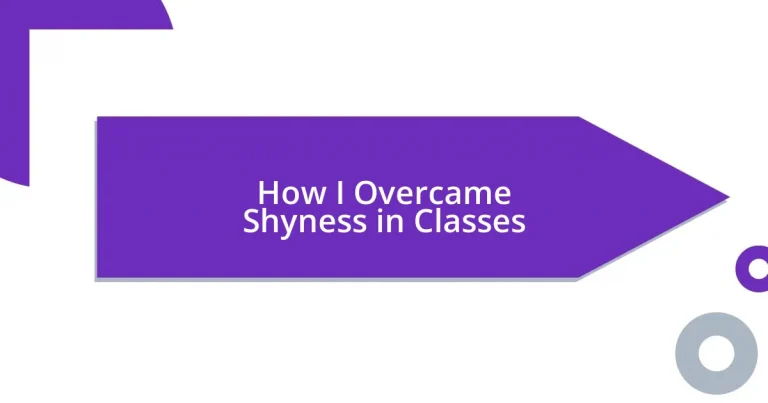Key takeaways:
- Understanding shyness involves recognizing underlying fears and insecurities that hinder participation in class discussions.
- Identifying specific triggers of shyness, such as being called on unexpectedly or presenting in front of peers, allows for targeted coping strategies.
- Setting realistic goals, starting small, and celebrating progress is crucial for building confidence and overcoming shyness.
- Seeking support from peers and practicing communication skills through role-playing and workshops significantly aids in personal growth and comfort in speaking.
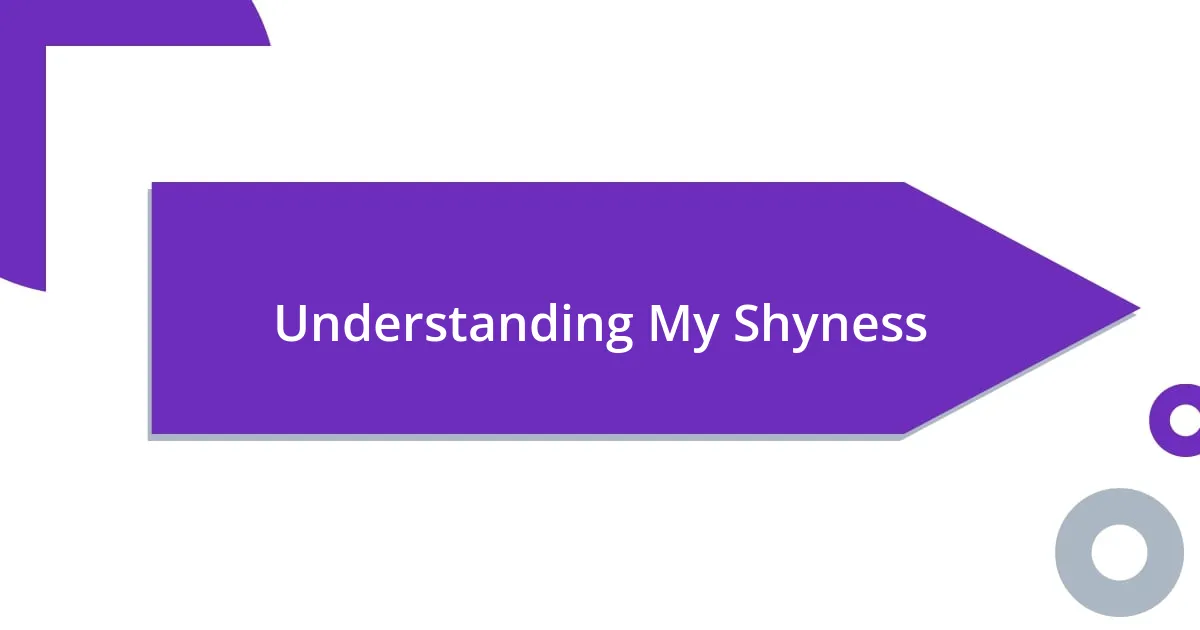
Understanding My Shyness
Understanding my shyness was like peeling back layers of an onion. At first, it felt just like a simple hesitation in speaking up. But as I delved deeper, I realized it stemmed from a mixture of fear and insecurity. I often found myself avoiding participation in class discussions, worried about how others might judge my thoughts.
I vividly remember one instance where my heart raced as my teacher posed a question. I wanted to raise my hand, but a voice inside me whispered, “What if they laugh at you?” That internal dialogue stopped me in my tracks, leaving me stuck while my classmates answered confidently. Has anyone else felt that paralyzing grip of self-doubt in a classroom setting? It’s suffocating, isn’t it?
Looking back, I can identify the moments that fueled my shyness. During group projects, I’d often retreat to the shadows, letting others shine. I questioned whether my ideas were worthy of sharing, leading to a vicious cycle of insecurity. It’s remarkable how those experiences shaped my perception of myself in academic settings and made me realize that understanding my shyness was the first step toward overcoming it.
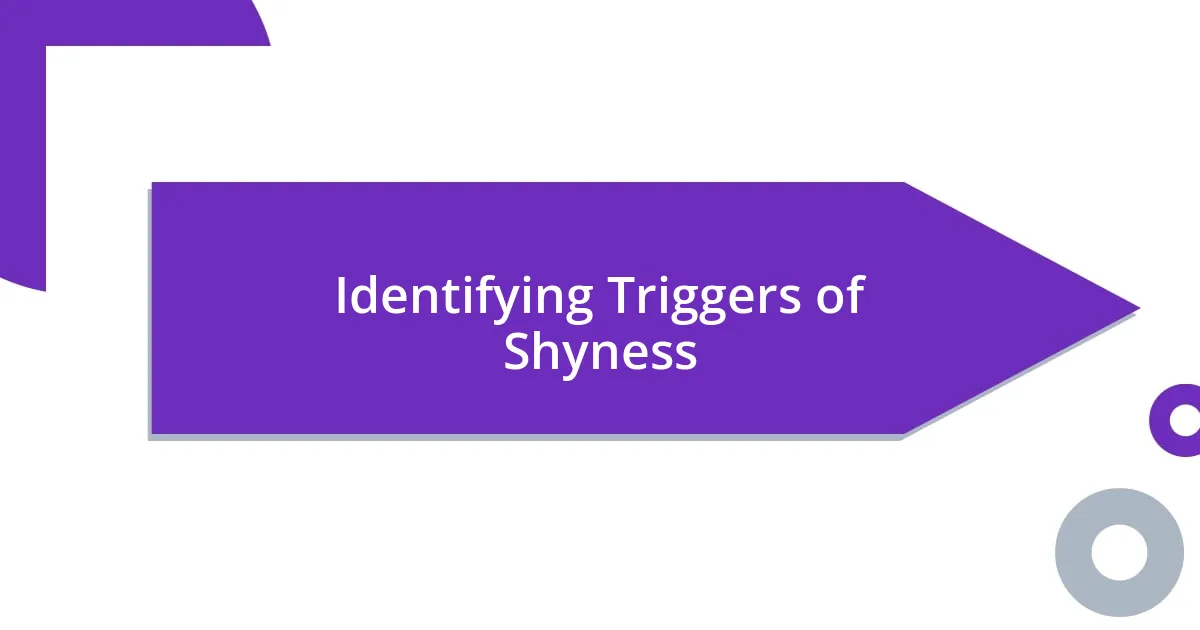
Identifying Triggers of Shyness
Identifying the triggers of my shyness was a pivotal step in my journey. Certain situations had a uncanny ability to trigger that all-too-familiar feeling of apprehension. For instance, when the teacher called on me unexpectedly, I could feel the tension building like a pressure cooker. My palms would sweat, and suddenly, all the words I had prepped in my mind faded away. It was essential for me to pinpoint these specific scenarios, as recognition allowed me to prepare and strategize for future interactions.
Some common triggers I discovered included:
- Being called on unexpectedly: The element of surprise wreaked havoc on my confidence.
- Presenting in front of peers: The thought of being evaluated made me freeze.
- Joining group discussions: The fear of interrupting others or not measuring up held me back.
- Sharing personal opinions: Vulnerability felt daunting, especially in a judgmental environment.
Recognizing these patterns provided clarity and helped me develop coping mechanisms to address and eventually overcome my shyness.
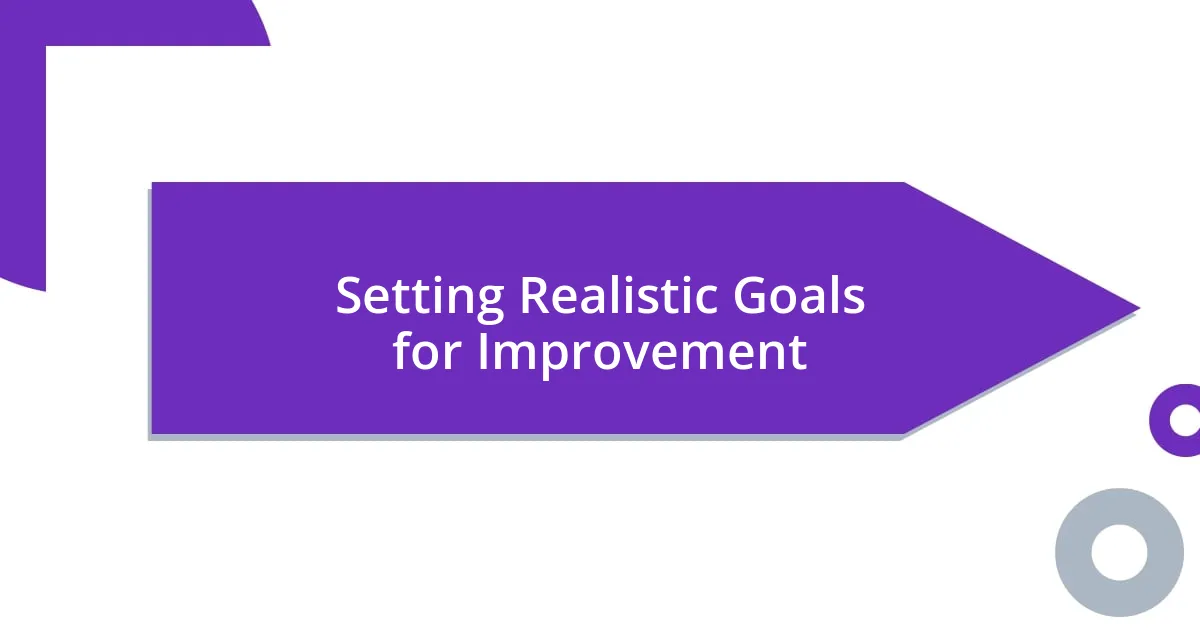
Setting Realistic Goals for Improvement
Setting realistic goals is essential for anyone looking to overcome shyness in class. For me, it began with small, manageable objectives. Instead of aiming to speak up in every class immediately, I targeted one specific class where I felt slightly more comfortable. This approach felt less overwhelming and allowed me to celebrate small victories along the way.
As I gained confidence, I expanded my goals gradually. I moved from simply raising my hand to actively contributing to discussions. I remember the rush of pride I felt the first time I spoke up. That small act made a significant difference, igniting a sense of accomplishment that fueled my desire to engage even further.
One key takeaway from my experience is that celebrating progress is essential. Each small goal achieved builds a foundation of confidence. I learned to appreciate even the tiniest steps forward, finding that this positive reinforcement encouraged me to keep pushing my boundaries. Don’t underestimate the power of reasonable goals; they are the stepping stones to overcoming shyness effectively.
| Goal Type | Description |
|---|---|
| Short-term Goal | Raise hand once per week in class. |
| Medium-term Goal | Participate in one class discussion per week. |
| Long-term Goal | Give a presentation in front of the class. |

Techniques to Conquer Fear
One technique that helped me conquer fear was practicing mindfulness. Whenever I felt the familiar butterflies before speaking, I took a moment to breathe deeply and ground myself. Focusing on my breath allowed me to center my thoughts and manage those anxious feelings, which felt empowering. Have you ever noticed how a few deep breaths can create a sense of calm amid chaos? It’s remarkable how a simple technique can shift your mindset.
Another approach that made a significant difference for me was visualization. Before heading into class, I would close my eyes and imagine myself speaking confidently. I could picture the smiles and nods from my classmates, which helped replace fear with reassurance. What would it be like for you to visualize a successful moment? This mental practice became a preemptive strike against my anxiety, instilling a sense of readiness when it came time to engage.
Lastly, I found that seeking support from peers or mentors was invaluable in my journey. Sharing my fears with understanding friends made the burden lighter and offered me different perspectives. I recall how a close friend encouraged me to form a study group, making it easier to speak up in a casual setting. Have you considered how a supportive group could change your experience? Building those connections helped create an environment where I felt safe to express myself, ultimately transforming my fear into a source of growth.
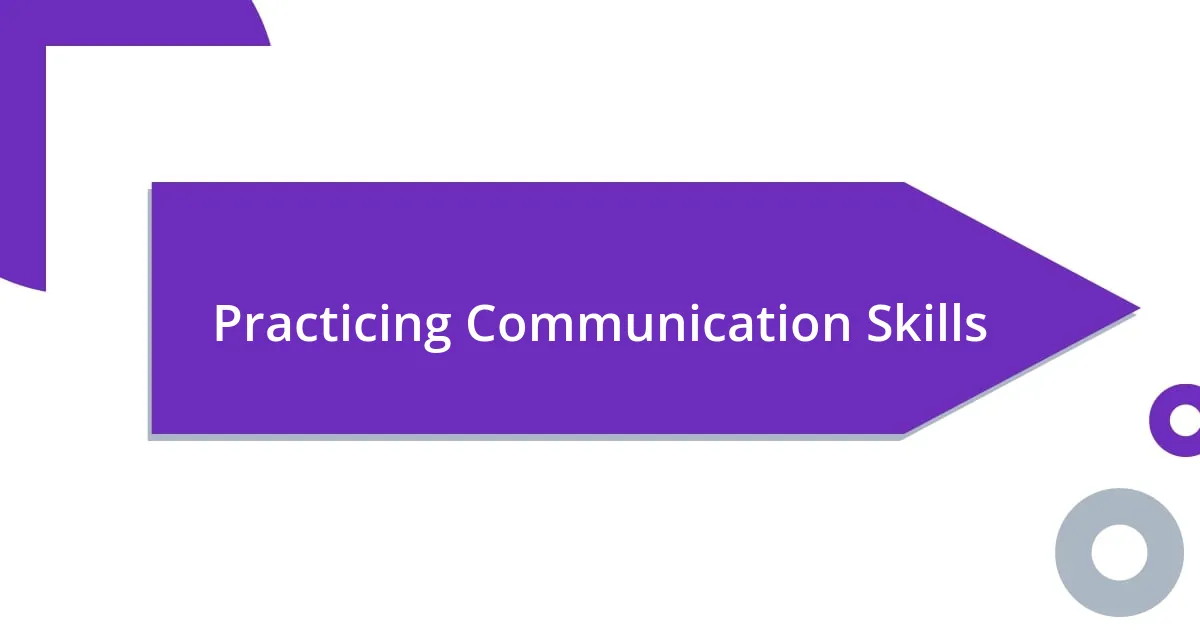
Practicing Communication Skills
Practicing communication skills was a game-changer for me. I remember the first time I attended a public speaking workshop. Walking into that room, I felt a mix of excitement and sheer terror. But as I practiced speaking in front of a group, I gradually learned to articulate my thoughts. It wasn’t just about the words; it was about expressing myself authentically. Have you ever experienced that moment when you finally convey what’s in your heart? It’s liberating.
Another effective method I embraced was role-playing with friends. We would simulate class scenarios where I’d have to voice my opinions or ask questions. I vividly recall one session when I mimicked a class discussion on a book we all loved. To my surprise, stepping into that imaginary debate made me realize how passionate I truly felt about the topic. Wasn’t it fascinating to find that the joy of sharing ideas outweighed my initial apprehensions?
I also found it helpful to keep a daily journal focused on my communication experiences. After each class, I’d jot down moments when I spoke up or felt anxious about speaking. This practice not only tracked my progress but highlighted patterns I hadn’t noticed before. I discovered that my fears often came from overthinking what others might think rather than actual criticism. Could reflecting on our experiences shed light on our personal growth? For me, it truly opened up new avenues to enhance my confidence and communication skills.
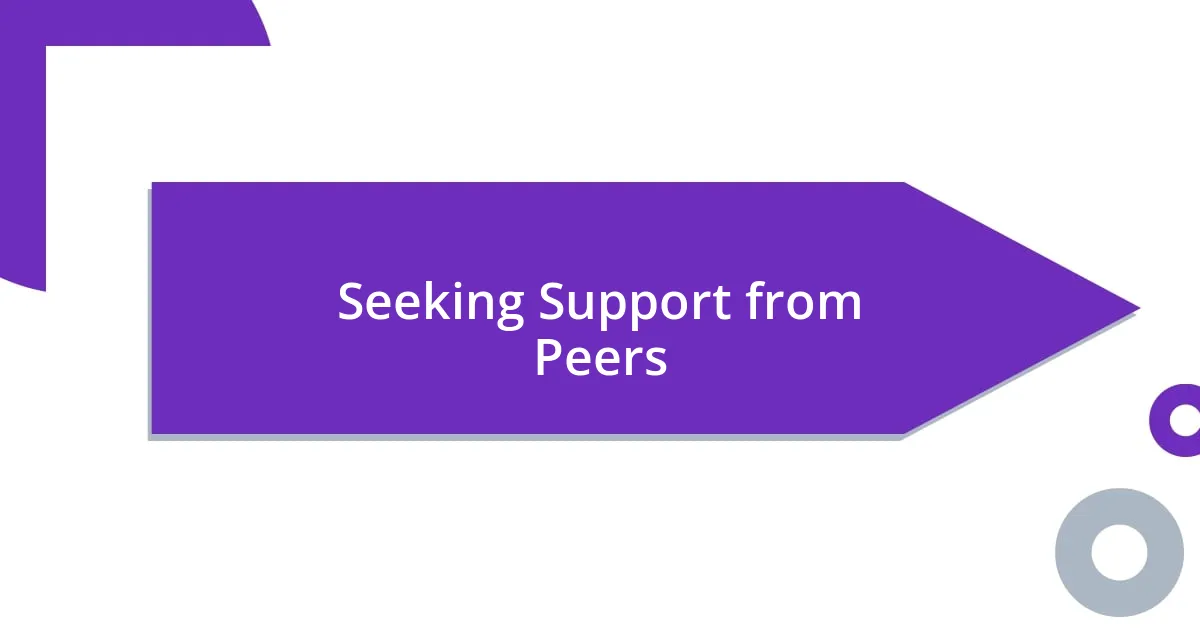
Seeking Support from Peers
Reaching out to my peers was a turning point in my journey. I remember one particularly nerve-wracking day in class when a friend noticed my unease. Instead of waiting for me to approach her, she reached out and asked if I wanted to partner up for a group assignment. In that moment, I felt a wave of relief wash over me. How often do we underestimate the power of someone simply asking, “Do you need help?” It’s amazing how this small gesture made me feel less isolated and more supported.
As I continued to seek support from my classmates, I discovered the importance of creating those connections. I joined a study group where everyone had their own quirks and fears, and it was comforting to know we were in the same boat. One day, while discussing a challenging topic, I shared my fear of public speaking. To my surprise, several others opened up about their struggles too. It struck me then—sharing our vulnerabilities can foster stronger bonds. Have you ever experienced that sense of unity when you realize you’re not alone in your fears? It’s a profound feeling that makes the challenges seem more manageable.
The most rewarding experience came when I began to actively participate in discussions with my peers. I remember the thrill of finally contributing to a debate that I’d been too shy to join previously. One classmate, who always seemed so confident, encouraged me with a thumbs-up after I spoke. That simple acknowledgment gave me a boost I hadn’t anticipated. Seeking support isn’t just about finding someone to lean on; it’s also about recognizing that we can lift each other up. Could these shared moments of encouragement be the secret sauce to overcoming our fears? For me, they definitely were.
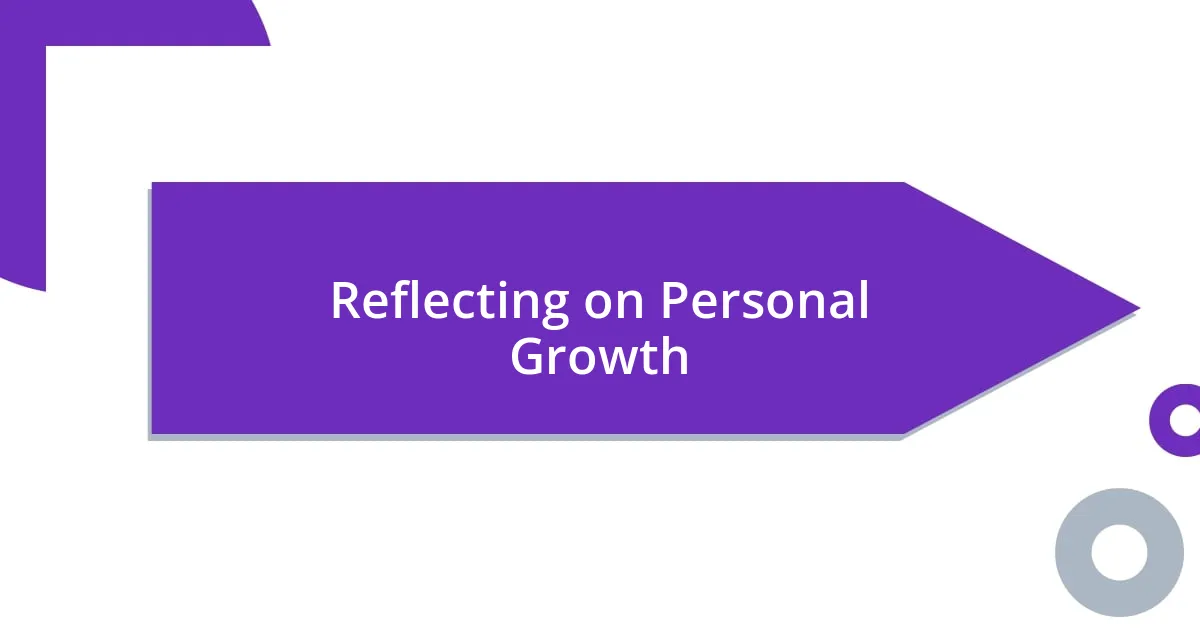
Reflecting on Personal Growth
Reflecting on my personal growth has unveiled layers of understanding I never anticipated. I recall standing in front of a mirror, rehearsing speeches I’d simply avoided in the past. Watching my expressions shift from uncertainty to determination was powerful. Have you ever looked at yourself and felt a spark of pride for how far you’ve come? That moment was transformative for me.
Every small victory in class pushed me to confront my fears head-on. I remember the first time I raised my hand to answer a question that had lingered in my mind throughout the lecture. The exhilaration that surged through me was unlike anything I had felt before. It made me realize that overcoming shyness isn’t a one-time event; rather, it’s a series of small steps that lead you closer to being the person you aspire to be. Doesn’t it make you think about the moments we let slip away by staying silent?
As I look back now, I recognize that my journey shaped not just my ability to speak but also my confidence in connecting with others. I often find myself laughing at how nervous I once was, wishing I could tell my past self that it’s normal to feel uncomfortable. The growth I experienced was not merely about gaining confidence in speaking; it was about embracing vulnerability and finding my voice. Isn’t it fascinating how each struggle we face can turn into a stepping stone toward self-discovery? For me, those reflections remind me why I continue to strive for growth every day.












